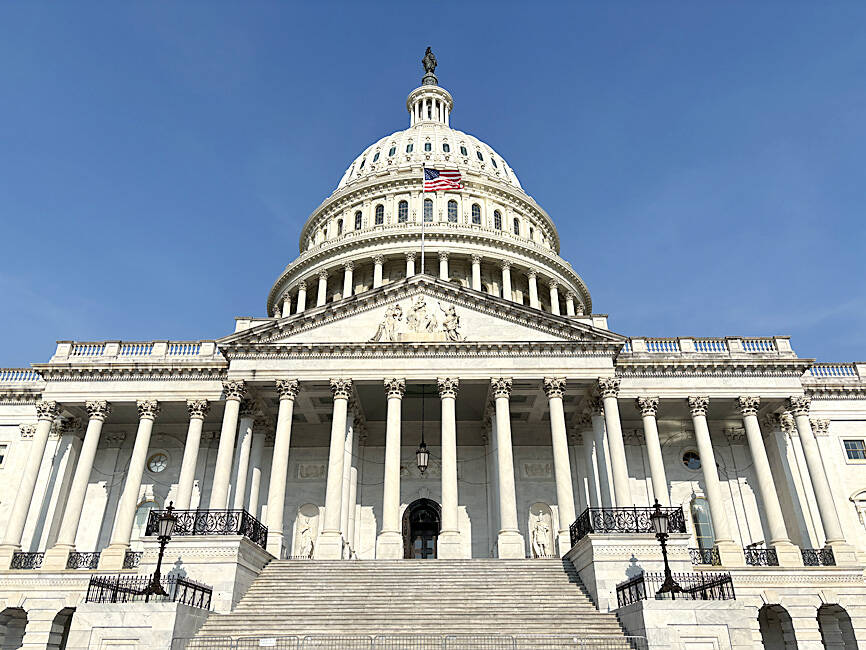A bill aimed at protecting Taiwan’s undersea communications cables from Chinese “gray zone” tactics was introduced in the US Senate on Wednesday, calling on the US government to help improve cable resilience near Taiwan.
The proposed Taiwan undersea cable resilience initiative act was introduced by US senators John Curtis and Jacky Rosen, both of whom are members of the Senate Foreign Relations Committee.
The bill calls on the US government to establish an initiative, led by the US Department of State in coordination with the US Department of Defense and the US Department of Homeland Security, as well as the US Coast Guard, to deploy real-time monitoring systems, develop rapid-response protocols, improve maritime surveillance and improve international cooperation against sabotage.

Photo: CNA
“Gray zone” refers to ambiguous or unconventional tactics used to gain a strategic advantage without provoking open conflict.
Disrupting undersea cables is a key part of China’s military strategy “to cripple Taiwan’s communications in a conflict,” Curtis and Rosen said in a statement.
Since February 2023, at least 11 undersea cable disruptions have been reported around Taiwan, most of them linked to vessels suspected of deliberate interference, the statement said.
“We can’t stand idle as China ramps up its tactics to isolate Taiwan, including by sabotaging its vital undersea cables,” Curtis said. “By improving systems monitoring and helping increase cable resiliency, our bipartisan legislation sends a clear message: the United States stands with Taiwan and our allies in defending shared infrastructure, sovereignty, and freedom.”
Also on Wednesday, Curtis and US Senator Chris van Hollen reintroduced bipartisan legislation supporting Taiwan’s participation in international organizations.
The Taiwan international solidarity act aims to clarify that UN Resolution 2758 does not prevent the US from using its vote, voice and influence to oppose efforts to undermine Taiwan’s position on the world stage.
The solidarity legislation also encourages the US to work with allies and partners to oppose the People’s Republic of China’s efforts to undermine Taiwan’s diplomatic relationships and partnerships globally.
“The United Nations must not become a platform for that distortion. It must stand for clarity,” Curtis said in a separate statement.
The legislative effort would ensure that Washington pushes back against “false claims and stands up for Taiwan’s dignity and right to self-determination,” he added.
A version of the bill introduced by US representatives Gerry Connolly and Young Kim passed the US House of Representatives in May.
A similar bill passed the House in 2023, but was not considered by the Senate, so it was reintroduced after the new Congress convened on Jan. 3.
The two bills introduced must pass the Senate and the House before the US president can sign or veto them.

A magnitude 5.6 earthquake struck off the coast of Yilan County at 12:37pm today, with clear shaking felt across much of northern Taiwan. There were no immediate reports of damage. The epicenter of the quake was 16.9km east-southeast of Yilan County Hall offshore at a depth of 66.8km, Central Weather Administration (CWA) data showed. The maximum intensity registered at a 4 in Yilan County’s Nanao Township (南澳) on Taiwan’s seven-tier scale. Other parts of Yilan, as well as certain areas of Hualien County, Taipei, New Taipei City, Taoyuan, Hsinchu County, Taichung and Miaoli County, recorded intensities of 3. Residents of Yilan County and Taipei received

TRUST: The KMT said it respected the US’ timing and considerations, and hoped it would continue to honor its commitments to helping Taiwan bolster its defenses and deterrence US President Donald Trump is delaying a multibillion-dollar arms sale to Taiwan to ensure his visit to Beijing is successful, a New York Times report said. The weapons sales package has stalled in the US Department of State, the report said, citing US officials it did not identify. The White House has told agencies not to push forward ahead of Trump’s meeting with Chinese President Xi Jinping (習近平), it said. The two last month held a phone call to discuss trade and geopolitical flashpoints ahead of the summit. Xi raised the Taiwan issue and urged the US to handle arms sales to

Taiwan has secured another breakthrough in fruit exports, with jujubes, dragon fruit and lychees approved for shipment to the EU, the Ministry of Agriculture said yesterday. The Animal and Plant Health Inspection Agency on Thursday received formal notification of the approval from the EU, the ministry said, adding that the decision was expected to expand Taiwanese fruit producers’ access to high-end European markets. Taiwan exported 126 tonnes of lychees last year, valued at US$1.48 million, with Japan accounting for 102 tonnes. Other export destinations included New Zealand, Hong Kong, the US and Australia, ministry data showed. Jujube exports totaled 103 tonnes, valued at

BIG SPENDERS: Foreign investors bought the most Taiwan equities since 2005, signaling confidence that an AI boom would continue to benefit chipmakers Taiwan Semiconductor Manufacturing Co’s (TSMC, 台積電) market capitalization swelled to US$2 trillion for the first time following a 4.25 percent rally in its American depositary receipts (ADR) overnight, putting the world’s biggest contract chipmaker sixth on the list of the world’s biggest companies by market capitalization, just behind Amazon.com Inc. The site CompaniesMarketcap.com ranked TSMC ahead of Saudi Aramco and Meta Platforms Inc. The Taiwanese company’s ADRs on Tuesday surged to US$385.75 on the New York Stock Exchange, as strong demand for artificial intelligence (AI) applications led to chip supply constraints and boost revenue growth to record-breaking levels. Each TSMC ADR represents